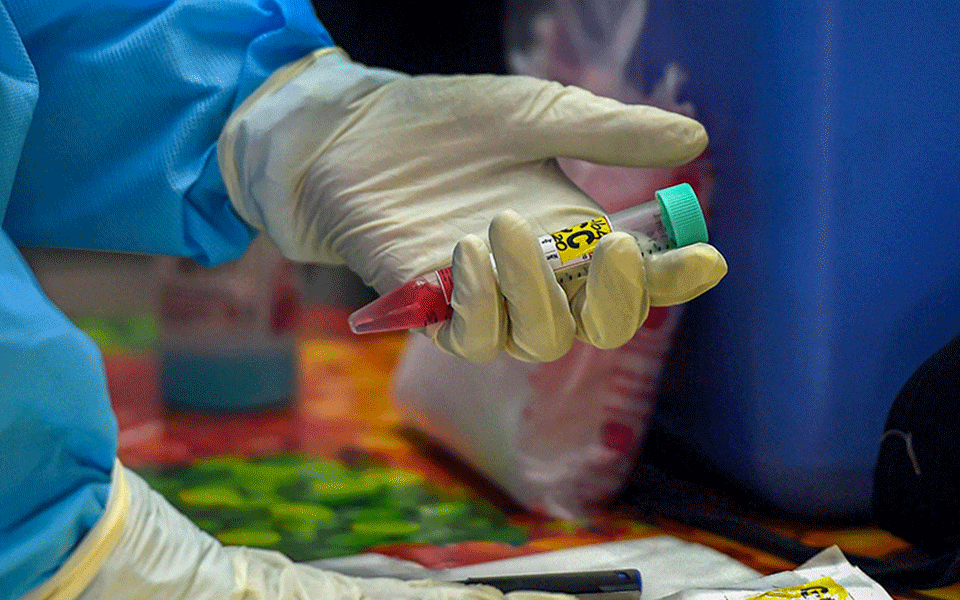New Delhi: COVID-19 patients admitted to intensive care in the early months of the pandemic experienced a higher burden of delirium and coma than is typically found in those hospitalized with acute respiratory failure, according to the largest study of its kind to date.
The research, published in The Lancet Respiratory Medicine journal, tracked the incidence of delirium and coma in over 2,000 COVID-19 patients admitted before April 28, 2020, to 69 adult intensive care units across 14 countries.
According to the scientists, led by those at Vanderbilt University Medical Center in the US, the choice of sedative medications and curbs on family visitation played a role in increasing acute brain dysfunction for these patients.
They said ICU delirium is associated with higher medical costs and greater risk of death and long-term ICU-related dementia.
Nearly 82 percent of the patients in the study were comatose for a median of 10 days, and 55 percent were delirious for a median of three days.
The scientists noted that acute brain dysfunction lasted for an average of 12 days.
"This is double what is seen in non-COVID ICU patients," said study co-author Brenda Pun from VUMC.
The scientists believe COVID-19 could predispose patients to a higher burden of acute brain dysfunction.
However, they also noted that patient care factors, some of which are related to pressures posed on health care by the pandemic, also appear to have played a significant role.
With respect to COVID-19, the scientists believe there has been widespread abandonment of newer clinical protocols that are proven to help ward off the acute brain dysfunction that usually affects many critically ill patients.
"It is clear in our findings that many ICUs reverted to sedation practices that are not in line with best practice guidelines and we're left to speculate on the causes," Pun said.
"Early reports of COVID-19 suggested that the lung dysfunction seen required unique management techniques including deep sedation. In the process, key preventive measures against acute brain dysfunction went somewhat by the boards," she added.
Analyzing patient characteristics from electronic health records, and care practices, and findings from clinical assessments, the scientists found that about 90 percent of patients tracked in the study were invasively mechanical ventilated at some point during hospitalization, and 67 percent on the day of ICU admission.
Patients receiving benzodiazepine sedative infusions were at 59 percent higher risk of developing delirium, they added.
In comparison, the patients who received family visitation were at 30 percent lower risk of delirium, the study noted.
"There's no reason to think that, since the close of our study, the situation for these patients has changed," said study senior author, Pratik Pandharipande.
"These prolonged periods of acute brain dysfunction are largely avoidable. ICU teams need above all to return to lighter levels of sedation for these patients, frequent awakening and breathing trials, mobilization, and safe in-person or virtual visitation," Pandharipande added.
Let the Truth be known. If you read VB and like VB, please be a VB Supporter and Help us deliver the Truth to one and all.
Hyderabad (PTI): Telangana Chief Minister A Revanth Reddy met Union Home Minister Amit Shah in Delhi on Wednesday night and urged him to increase the sanctioned strength of IPS officers to the state in view of its growing administrative and security needs.
The two leaders also discussed the recent surrender of several senior Maoist leaders before the Telangana Police and other issues.
"During the meeting, the two leaders discussed the issue of Maoist surrenders and their rehabilitation. The chief minister informed Shah that significant improvements in policing have taken place in Telangana over the past two years," an official release here said.
Highlighting that 591 Maoists have laid down their arms and joined the mainstream of society during this period, the chief minister said the state government was providing them compensation and rehabilitation assistance as per the rules.
He requested the Union home minister to extend financial support from the central government for development works in the backward regions of the state.
Reddy also urged Shah to increase the sanctioned strength of IPS officers to the state from 83 to 105 in line with the state's growing administrative and security needs, the statement said.
The first cadre review after the formation of Telangana was conducted in 2016, while the next review, due in 2021, was delayed and finally carried out in 2025. Even then, only seven additional IPS officers were allocated to the state, the chief minister informed Shah and requested that the third cadre review be conducted in 2026 as per the schedule.
Reddy explained that Telangana, like the rest of the country, is facing several modern challenges, including cybercrime, drug trafficking, white-collar crimes, and other emerging security threats.
He highlighted the reorganisation of the Hyderabad, Cyberabad, and Malkajgiri Police Commissionerates, the proposed formation of the Future City Commissionerate and the rapidly growing population in Hyderabad to underline the increasing administrative requirements of the state.





